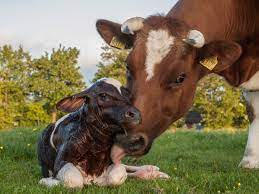The BBC Panorama documentary, A Cow’s Life : The True Cost of Milk [1], shown last week highlighted a number of disturbing problems in the dairy industry. None of them are new.
Exhausted and burnt out cows with lives shortened by successive years of industrial milk production, now 40% more per cow than it was 30 years ago. Calves separated from the mothers within an hour of birth. Footage was shown of fallen animals on a UK Red Tractor certified farm, beaten and kicked to get them standing again.
The main conclusion of the documentary was that most of these problems can be solved by raising the price of milk in order to pay for better conditions and monitoring of standards.
But although these problems are the inevitable consequence of cheap milk, surely the most rational and ethical response is to end dairy consumption altogether.
Why no dairy?
First, looking to improve standards is good, and any improvement is to be welcomed, but it seems to me that the practice of calf-cow separation is an unresolvable problem at the heart of the dairy industry.
One of the farmers in the documentary agreed that this is a problem: “This is the biggest issue that dairy farms globally are focusing on. Most farms will separate calves from cows within the first 24-48 hours. It’s a very complex issue”.
Surely if we accept the fact that the cows are sentient, social animals with feelings and emotions, bonding to their young then it is clear that the way this is done on most farms is indefensible.
Second, Red Tractor with its pre-announced visits did not detect the documented abuses. It rarely has. Over three years ago, in my first week as a vegan, a nearby red-tractor certified pig farm was filmed mistreating pigs. Clearly little has changed since then. Why in both of these cases does it require an animal activist to expose the abuse after a succession of Red Tractor visits have found nothing? Farmers protest that this is an isolated incident, but with such weak enforcement of standards who knows how widespread the problem is.
Interestingly, The Ethical Dairy Farm [2], interviewed on the program, appears to have mitigated the problem by keeping calves with their mothers for several months, but in order to remain commercially viable, among other things, they sell artisan cheese at £40 per kilo.
So they are clearly not competing with the wholesale dairy suppliers to high street coffee shops and supermarkets responsible for the low prices at the farm gate.
But there are still many other reasons for avoiding their dairy products, described in earlier blog posts.
Third, for historical and cultural reasons, we recognise the capacity of some animals for friendship, emotion, intelligence and social bonding, but deny this to others.
Instead we chose to exploit them for food and other reasons.
Why should another animal that loves to have fun [3], and enjoys friendship [4] and social relationships [5] be treated differently? Can this be right?
Fourth, the science is clear about the significant negative environmental impacts of industrial dairy farming such as the CO2 and methane emissions contributing to global warming, the effects of effluent run-off on water quality, and the overuse of antibiotics on livestock leading to growing anti-bacterial resistance.
Contrast this with the plant-based alternatives! Joseph Poore from the University of Oxford writes,
“for some plant milks, the environmental impact of the crop itself is almost negligible in comparison to dairy” [6]
So what can be done?
It only takes a minute to reflect on what is happening in the dairy industry and to resolve not to consume any more dairy products. There are many plant-based alternatives to choose from.
Of course, for some people this may not be easy, and dairy can only be replaced in part to start with. Nevertheless, it will make a difference. Enough for a first step.
[1a] https://www.bbc.co.uk/programmes/m0014mkh [No longer available for viewing]
[1b] https://www.youtube.com/watch?v=ih3pIv-RpGI [Youtube version]
[2] https://www.theethicaldairy.co.uk/blog/spotlight
[3] https://youtu.be/Ca_VPwM5h8U
[4] https://www.theatlantic.com/magazine/archive/2019/11/bovine-friends-forever/598417
[5] https://www.psychologytoday.com/us/blog/animal-emotions/201711/cows-science-shows-theyre-bright-and-emotional-individuals
[6] https://www.bbc.com/future/article/20200207-which-milk-alternative-should-we-be-drinking
